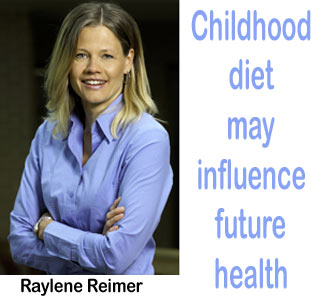
This interesting research was conducted by Dr. Raylene Reimer, researcher of the University of Calgary, Faculty of Kinesiology. She is a leader in a growing field of study that determines the developmental origins of health and disease. The researchers in this study directly link childhood diet with weight issues in adulthood. They say a person’s pre-natal and early childhood environment may have a role to play on that person’s risk of developing various conditions like heart diseases, diabetes and obesity, in adulthood.
Reimer says that, “My research has shown that the food we eat changes how active certain genes in our body are – what we call genetic expression. In particular we believe that our diet has a direct influence on the genes that control how our bodies store and use nutrients. There’s a growing body of work that indicates a relationship between our health as adults and our early diet, and even our mother’s diet. This research shows for the first time that our early childhood diet may have a huge impact on our health as adults.â€
“I believe this study clearly shows that the composition of early childhood diet may have a direct lifelong impact on genes that control metabolism and obesity risk. This study clearly indicates that diet composition alone can change the trajectory of circulating satiety hormones and metabolic pathways that influence how we gain weight or control blood sugar as adults,†she says.
An experiment was conducted on three groups of very young rats. They were all fed different set of diets; a high protein diet, a high fiber diet, and a controlled diet. In adulthood, the diet of these rats was changed. They were fed a high fat and a sugar diet. This diet was a reflection of an archetype western human diet. The results revealed that the rats fed high protein as kids, put on more weight as compared to the one’s fed with a high-fiber diet. The rats on high fiber diet as kids had gained the least amount of weight.
Reamer recommends soon-to-be-mothers to follow guidelines and nourish themselves and their infant with a proper diet. They should follow a healthy diet during pregnancy as well as in infancy and childhood.
Reimer’s research is published in the Journal of Physiology (London).
